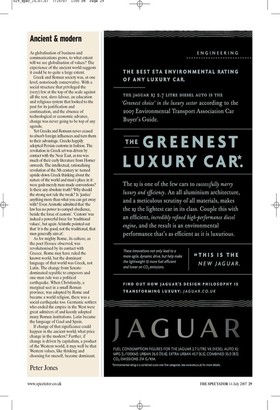Ancient & modern
As globalisation of business and communications grows, to what extent will we see globalisation of values? The experience of the ancient world suggests it could be to quite a large extent.
Greek and Roman society was, at one level, notoriously conservative. With a social structure that privileged the (very) few at the top of the scale against all the rest, slave-labour, an education and religious system that looked to the past for its justification and continuation, and the absence of technological or economic advance, change was never going to be top of any agenda.
Yet Greeks and Romans never ceased to absorb foreign influences and turn them to their advantage. Greeks happily adopted Persian customs in fashion. The revolution in Greek art was driven by contact with the Near East, as too was much of their early literature from Homer onwards. The intellectual, rationalising revolution of the 5th century BC turned upside-down Greek thinking about the nature of the world and man's place in it: were gods merely man-made conventions? Is there any absolute truth? Why should the strong not rule the weak? Is 'justice' anything more than what you can get away with? Even Aristotle admitted that `the law has no power to compel obedience, beside the force of custom'. 'Custom' was indeed a powerful force for 'traditional values', but again Aristotle pointed out that 'it is the good, not the traditional, that men generally aim at'.
As for mighty Rome, its culture, as the poet Horace observed, was revolutionised by its contact with Greece. Rome may have ruled the known world, but the dominant language of that world was Greek, not Latin. The change from Senatedominated republic to emperors and one-man rule was a political earthquake. When Christianity, a marginal sect in a small Roman province, was adopted by Rome and became a world religion, there was a social earthquake too. Germanic settlers who ended the empire in the West were great admirers of and keenly adopted many Roman institutions. Latin became the language of Gaul and Spain.
If change of that significance could happen in the ancient world, what price change in the modern? Further, if change is driven by capitalism, a product of the Western world, it may well be that Western values, like thinking and choosing for oneself, become dominant.
Peter Jones

















































 Previous page
Previous page